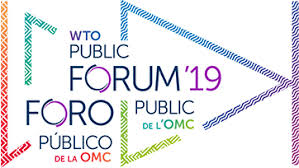Fair data and trade in services: An ethical dimension
11 Oct 2019 02:00h
Event report
[Read more session reports from WTO Public Forum 2019]
Mr Jarmo Sareva (Ambassador for Innovation, Ministry for Foreign Affairs, Finland) introduced the panellists and the dynamics of the session. He explained that the Mydata principles, introduced in Finland five years ago, have taken root in the country and are now part of international discussions. The idea behind these principles, in a nutshell, is that individuals should be in control of their data and the data that affects them.
Ms Maria Rautavirta (Director of Data Business Unit, Ministry of Transport and Communications, Finland) mentioned that data is at the core of the Finnish presidency of the EU Council. This is consistent with the fact that Finland is a forerunner in data utilisation. The country uses data to provide better user-driven services. Finland is proposing discussions on data principles at the EU and the WTO because this is a global necessity. Just like infrastructure, principles also need to be interoperable on a global scale. There are many opportunities for Europe if the continent adopts an approach to data based on ethics and fair use, and on a human-centric view of the data economy. Moving beyond the General Data Protection Regulation (GDPR), practical tools may empower citizens with regard to their data.
Mr Teemu Ropponen (General Manager, MyData Global) explained that the goal of MyData is to give individuals an agency to control the use of their data. Currently, societies need to find a balance between the right to privacy and the fact that in order to function properly, good services require the sharing of data. MyData proposes a ‘BLT Sandwich’ approach to the topic, based on addressing this issue from business, legal, technical, and societal perspectives. The MyData declaration explains that a shift towards a use of data that empowers individuals implies: 1) a move from friction to action by making the exercise of rights simple and easy; 2) a move from data protection to data empowerment; and 3) a move from digital monopolies to freedom of choice.
Ms Keerthika M. Subramanian (Founding Member, IEEE Global Initiative to Standardize Fairness in the Trade of Data) mentioned that the IEEE launched a global initiative to standardise fairness in the trade of data. It proposes a set of recommendations to set the base for a global understanding of fair data standards. The US has no federal legislation on privacy. Abroad, the GDPR is available and the privacy framework developed by China can be utilised, but data protection is generally decentralised around the world. It is a critical time to address gaps. After the Cambridge Analytica scandal and other data leaks, consumer trust is in crisis.
Mr Edward Corcoran (Senior Manager, Digital Regulation and Trends, BBVA) asserted that with new technologies and digitalisation, data has taken an unprecedented role in public and private spheres. Firms that want to compete in the digital economy need to use data effectively. Nevertheless, concerns need to be addressed, such as the way data and social platforms interfere with democracy. Another concern arises over competition and the rise of extremely large firms. First movers grow rapidly in the digital sphere and they can exploit economies of scale. Lastly, many businesses fear stagnation in the digital economy. The need to remain competitive is motivating several policy debates in the EU. To increase competitiveness, effective use of data is essential.
Corcoran argued that data sharing should be a real-time and easy experience for users. The sharing of data needs to follow security standards that are proportional to the nature of the data: sensitive data merits more stringent standards, yet standardisation in this area will probably not happen without some regulatory backing. In the EU, the GDPR has created the right to the portability of data, but this right will probably need further layers of regulation to effect its exercise by individuals. Even so, if regulation happens on the national level, it will introduce fragmentation and barriers to trade. International dialogue and co-operation are needed to define common rules of the road.
Questions from the audience revolved around how data and trade can benefit developing countries; the role of Council of Europe’s Convention 108 in promoting regulatory alignment; the relation between IEEE Global Initiative on Ethics of Autonomous and Intelligent Systems and the Global Initiative to Standardize Fairness in the trade of data; the monetisation of data by individuals, how individuals can practically manage their data in everyday life; the collective ownership of data; and the best international forum to conduct discussions on data issues and ways to help small businesses with the burden of GDPR compliance.
Related topics
Related event

